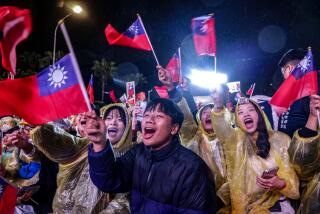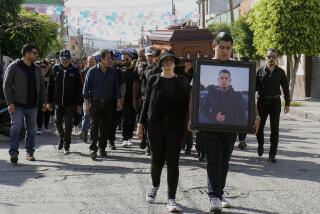Election Draws Huge Turnout in East Timor
- Share via
LIQUICA, East Timor — One of the first things you notice about Jose Serrao is the dark 6-inch scar that runs from his right cheek to the back of his neck.
Serrao is a survivor of one of East Timor’s worst mass killings, the 1999 massacre by pro-Indonesian forces of at least 52 people who had taken refuge in the church here in the village of Liquica. One anti-independence militia thug struck Serrao with a machete and just missed cutting off his head.
On Thursday, Serrao got his revenge: He cast his ballot in East Timor’s first free election.
“I feel like maybe God gave me a longer life so I could vote for independence and see East Timor become a country that is democratic,” he said. “I feel very lucky.”
Democracy may be new to East Timor, but across the territory Thursday more than 350,000 people showed their determination to vote.
Some began walking from remote villages as early as 2 a.m. to reach polling places in bigger villages and towns. Lines formed hours before the voting started as huge crowds gathered.
Some voters stood in line in the hot sun for as long as seven hours. At 4 p.m., when the polls were to close, so many people remained in line at some voting centers that it took another five hours for all to cast their ballots.
Officials estimated turnout at 93% of the roughly 420,000 registered voters--an extraordinary figure in a land where voting is not compulsory.
East Timorese leaders and U.N. officials said the vote was the biggest step so far in efforts to build an independent country out of the rubble left two years ago by Indonesian soldiers and anti-independence militias. Indonesian troops seized the former Portuguese territory in 1975 and ruled it until the U.N. took over administration in late 1999.
The election will create an 88-member assembly to draft a constitution for the new nation, which is scheduled to become fully independent next year. The assembly also might become the nation’s first parliament.
About 500 foreign election observers monitored the vote. Election authorities received only one official complaint: a report that one poll worker attempted to influence voters.
There were no reports of violence, unlike the balloting two years ago when pro-Indonesian forces attempted to coerce the East Timorese into voting against independence.
After the province’s voters overwhelmingly backed independence in 1999, the militias laid waste to the territory, killing about 1,000 people, destroying 80% of the buildings and forcing 250,000 to flee to West Timor, which remains an Indonesian province.
The United Nations sent in peacekeeping troops and set up a transitional administration to run East Timor until it achieves independence.
Thursday’s vote, said U.N. chief electoral officer Carlos Valenzuela, will be remembered “as a peaceful election, and this will help reassure the East Timorese people that they can exercise their democratic rights without fear.”
In New York, U.N. Secretary-General Kofi Annan congratulated East Timor on the success of the election and called it a “glowing example to the world community.”
As part of the effort to establish democracy in East Timor, the U.N. administration has set up a unit to prosecute crimes against humanity arising from the 1999 violence, including more than half a dozen massacres.
Chief prosecutor Mohamed Othman said he hopes to indict within the next six weeks as many as 15 suspects for taking part in the slaughter at Liquica, a small coastal town about 20 miles west of Dili, the capital.
The Liquica massacre, on April 6, 1999, was the first large-scale attack on civilians after Indonesia agreed to call the referendum on independence. The attack also was notable because it showed that the Indonesian armed forces and police were working with anti-independence militias to intimidate voters.
Serrao said he was one of about 1,000 people who took refuge in the Roman Catholic church compound April 5 after soldiers and militia members began threatening residents in the area around the town.
That night, hundreds of soldiers, police officers and militia members surrounded the compound and warned the frightened Timorese that they would kill them the next day.
As promised, the force struck the next afternoon with guns and machetes. Soldiers fired tear gas into the church, and as the blinded refugees fled, the troops and militia cut them down.
Serrao said he had been hiding in the priest’s house and tried to escape through a window with his 4-year-old son. A militia member was waiting for them and swung his machete, just missing the boy and nearly severing Serrao’s head.
Serrao said he managed to walk about 100 yards from the carnage before collapsing from loss of blood. A friend helped him get to a hospital, although no one expected Serrao to live.
During the chaos, Serrao saw a cousin and several friends slaughtered. Today, he is still in pain from his wound and needs further surgery, which he cannot afford.
The Indonesian military attempted to cover up the massacre. Blood was hosed from the church, and the corpses were trucked away. Some bodies allegedly were dumped in a lake. Others were taken to West Timor. Only seven bodies have been recovered.
Some villagers estimate that as many 180 people were killed. Prosecutors say they have so far identified 52 victims by name, mainly from witness accounts. About 100 people were wounded.
“It’s an important case,” said chief prosecutor Othman. “Hundreds were involved in the attack. It took place 150 meters from the district military headquarters.”
Serrao said he gave investigators the names of a soldier and two militia members he recognized during the killings. “I just hope there will be a trial for them,” he said.
Serrao cast his ballot early Thursday at a school two blocks from the church. Like other injured survivors, he was allowed to vote without having to stand in line.
“We have fought for independence,” he said. “We are willing to fight and die. A lot of people are dead, but I still have a chance to vote for our representatives.”
More to Read
Sign up for Essential California
The most important California stories and recommendations in your inbox every morning.
You may occasionally receive promotional content from the Los Angeles Times.













